Turkey earthquake: The warnings at the luxury apartments that turned to dust
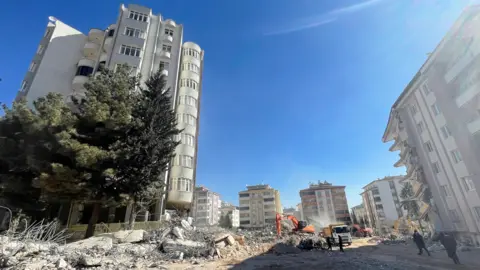 BBC
BBCWith only a bonfire for light and warmth on a bitter winter's night, an extended family sits at the roadside waiting for a miracle.
It's not coming.
They've been here for nine days and nights but their loved ones have not been found.
This personal grief is being played out in the rubble of one of the most desirable streets money can buy here.
"This is one of the most luxurious residential areas in Gaziantep," says musician Yunus Emre, whose cousin and his family of four are missing. "The wealthiest live here. Those flats are sold for millions."
But the price of the property in this city meant nothing when the earthquake struck.
"I'm just angry. I want to bring someone to justice but I don't know who," says the 28-year-old. For him, so many parties are culpable in what is not just a national tragedy but, with the collapse of so many buildings, a national scandal.
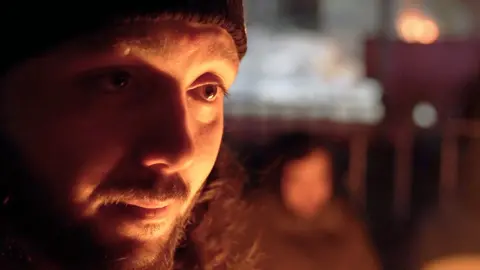
"It starts with the contractor," he explains.
"He uses low-quality building material. Next comes the certifying authority. They have the blood of people who died here on their hands.
"It's not right to scapegoat the contractor. The ones who approved this building are responsible together with the government and the state. They shouldn't have signed off on this building project at all."
The Ayşe Mehmet Polat apartment complex is 24 years old. Four of its six blocks collapsed while other buildings around it stood tall. Safety concerns had been raised by residents long before last week's deadly tremors.
We came to this site because we had heard that a man said to be the building's contractor had been arrested. He will later tell us through his lawyer he was doing nothing wrong and should bear no responsibility.
We spend three days looking at what happened here on 6 February.
As we return to the complex the next morning, emergency services reveal to us a shocking figure - 136 people are known to have died here as they slept.
At a petrol station next door, we ask if they have any CCTV footage of when the earthquakes struck. We are given videos from four separate cameras which show the horror unfolding. First, the violent shaking of the lights, then seconds later, people running for their lives before, finally, a thick cloud of smoke and dust enveloping everything in its path.
The neighbouring apartment buildings collapsed in a matter of seconds.
As we leave the petrol station, we are drawn to the pile of personal possessions on the edge of the forecourt. It is a deeply upsetting museum of lives suddenly extinguished - homework, dolls, cooking pans and family photos. Scouring the heap, and sobbing inconsolably, is 65-year-old Emel Filik.
"Everything is gone," she tells us.
She explains that her cousin had been sleeping in one of the four destroyed blocks, and no-one had taken responsibility for keeping the building safe.
"Once you start to live in your flat, nothing happens. No inspection. Earthquake insurance and property insurance don't work either. The municipality doesn't make checks. No such thing as monitoring."
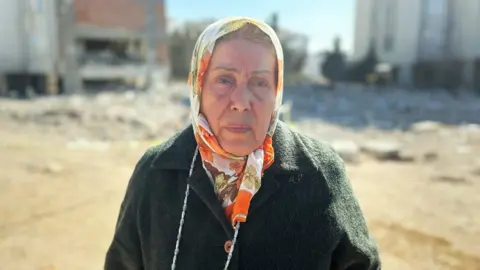
There had been concerns about these apartments, she says, adding that the head of the residents' association - a woman known as Selma - had even asked neighbours to come to a meeting to listen to her fears.
"Six months ago, Selma told us about the problems of the building. She said 'Dear residents, our buildings might collapse at the slightest of earthquakes. Let's strengthen the pillars. If you're short on money, the municipality could help us for a cheaper solution.' She held several meetings. But nothing happened."
We find a phone number for Selma and she confirms she held meetings to express her fears.
But should residents really have to pay to be safe in their own homes? This was a question of structural integrity, not repainting walls.
The head of the organisation representing architects in Turkey, Eyüp Muhçu, tells us the ultimate responsibility for making sure buildings are safe rests with the Turkish government.
"The priority of the central government was not to make the cities safe, but to implement some projects that were solely planned for maximising profits. For this reason, 65% of the current building stock in Turkey is risky. And no measures have been implemented regarding these risky structures."
With two residents having told us there had been potential problems within the blocks - we start trying to find out if those responsible for the building knew about it and whether they did anything.
When we had first arrived at the block the previous night, a boy had come up to us briefly to say his dad had pulled seven people from the rubble with his bare hands. It sounded a remarkable story, given the scale of the destruction we could see, but we didn't discount it.
And sure enough, when we hear others talking about the bravery of a man called Bahattin Aşan we decide to track him down.
"I saw the building twirling and crashing down. I came here running, it was dark, raining, there was snow and I was the first responder," he tells us.
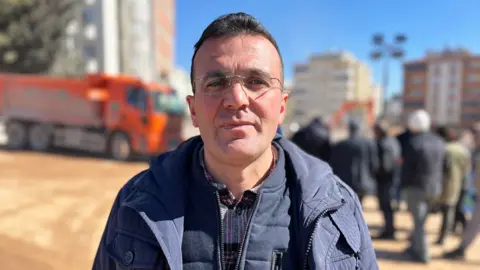
Bahattin Aşan used to work as a security guard at the housing complex.
He shows us a harrowing video he took in the smoking ruins, in which he's calling out to those trapped. Some people reply.
"I rescued seven people by myself. It was like the apocalypse. Even now as I'm telling you this, I'm still shaking," he says.
But what about these supposed concerns over the buildings' safety, I ask? Did he see this?
"In the car park, I witnessed the defects with my own eyes. When I touched the concrete columns it would crumble to dust in my hands, as though it wasn't concrete at all. Iron was rusting in the columns, the rainfall was damaging and corroded the iron."
When I ask Bahattin Aşan if he ever reported this, he insists it was obvious to the management as well as the residents.
"I used to tell a friend that if they were to give me a flat here I wouldn't take it. I said it was because I didn't think the columns were solid and in an earthquake the building would collapse."
But the man accused of being the contractor, Mehmet Akay, says the building complied with regulation at the time it was built. He claims that sewage and water works were added to the property after construction - and that this, or other work, may have damaged the supporting columns.
How many other security guards and caretakers across Turkey had voiced similar concerns in a country precariously positioned at the crossroads of shifting tectonic plates?
The immediate picture that is emerging in this Gaziantep neighbourhood is not of a cover-up or conspiracy - but either indifference or inaction.
Everyone knew there was a problem, but nobody did anything.
For opposition MP Garo Paylan, from the HDP party, who we meet as he visits this site, it is indicative of criminal negligence on an industrial scale in Turkish construction and oversight.
"This is a crime. This is a sin."
Mr Paylan accuses the government of Turkey's president, Recep Tayyip Erdogan, of failing to ensure the safety of new buildings as well as failing to strengthen older ones.
"The scientists were shouting about it, this disaster is coming, but the government did almost nothing. We warned the cities, we warned them to prepare the rescue teams, but they did nothing and we live this catastrophe. They say this is destiny. No, it is not. In civilised countries these kinds of disasters happen but fewer people die. But here we have tens of thousands of people under the rubble."
Mehmet Akay, the man whom authorities say was the building contractor for the Ayşe Mehmet Polat complex, was arrested on Saturday 11 February - five days after the earthquakes. He was stopped at Istanbul Airport as he tried to leave the country.
State prosecutors say he was the building contractor, but responding to questions put to him through his lawyer, Mr Akay claims he was the construction co-ordinator, but not the contractor. He also rejects accusations that cheap building materials were used.
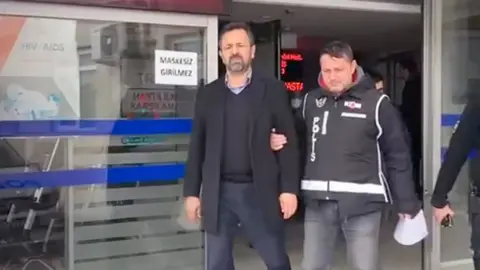 Istanbul Police
Istanbul PoliceIn Gaziantep, we ask the local authority, Şehitkamil Municipality, for a response. Spokesman Ahmet Aydın Sert says no complaints were received about the complex buildings, and therefore no inspections were made. "We went through the records and found no irregularities."
President Erdogan has conceded that the emergency response to the disaster was slow in places, but has urged his people not to listen to those whom he accuses of politicising a tragedy.
His government denies negligence and claims that more than 98% of buildings that collapsed were older - like the Ayşe Mehmet Polat complex - and built before the ruling party took office.
There are plenty who would say every country has a moral - if not legal - duty to protect its citizens, no matter the age of their property.
And when Turks go to the polls in the summer they will decide for themselves who can best ensure their families are safe in their own homes.
Additional reporting by Naomi Scherbel-Ball, Doğu Eroğlu, Dilay Yalçin and Jake Horton
Follow Nick Beake on Twitter
